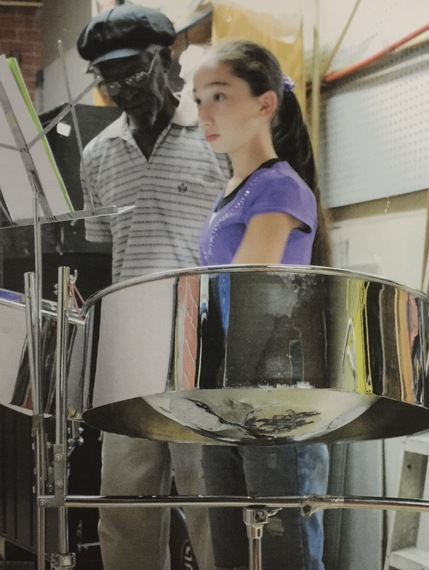It’s 10 am on a January day that’s colder than what I’m used to. Maybe it’s because of the ocean breeze that’s whipping my hair around my face like free formed streams of ice. It could be that everyone is moving around me. There’s bundled up vacationers briskly walking in front of me on the beach, sandpipers scurrying from the rolling waves, and my hands are gripping the mallets tightly as the pinging sound of my steel drums gets lost in the rushing sounds around me. This morning is freeze framed in my soul. It was a different world on the beach that day. The sounds, the movement, the uniqueness of being a street performer when I was 9 years old made an impact on me. It was a humbling impact, not only because when you look out over the ocean and experience a oneness as your own compass but also how insignificant but grand a person can be. Imagine playing two ginormous steel drums alone as a child there while people walk past you - sometimes smiling, usually not. A homeless man next to me carrying a conversation with me during my breaks and his own conversation to himself while I play. I fell for the steel drums that day but also for the lifestyle that it portrayed. A lifestyle of humbleness, freedom, musical sovereignty and at the end when I was breaking down to go home — I realized... after repeating four songs over for three hours — which may be why the homeless man was talking to himself, is I needed a teacher.
 Kelvin Hart was ancient. That was my first thought when I saw this wiry Trinidad man. When reading “To Hell with Dying” by Alice Walker, the character Mr. Sweet is described as being a “tall thinnish man with thick kinky hair going white.” I could not think of a better description for Kelvin. The second thought going through my head when I met Kelvin was regret. I was regretting learning and as our lesson progressed — I kept on regretting it. Kelvin spoke softly and very quick with a strong Trinidad accent, making him next to impossible to understand. Besides the verbal communication issue was the way he taught music — by ear. I was to memorize the song he played for me. I don’t think I got a single note right during the first lesson and if one was to ask who had more regret at the end of the lesson — we’d both say it was a tossup! The following lessons we learned from each other and as the months went by, I don’t know who looked forward to the lessons more — I’d say it was a tossup! I became his protégé, the student he bragged about with the other steel pan band members from his band, the Pepper Pot. I found out later, they’d practice behind his small white frame home, in a patch of dirt by the carport and in between the practice sessions, the conversations sprinkled with progress of the little protégé. When I gave him a copy of Tiger Beat Magazine that featured Justin Bieber on the cover and a feature article about me, he was ecstatic!
Kelvin Hart was ancient. That was my first thought when I saw this wiry Trinidad man. When reading “To Hell with Dying” by Alice Walker, the character Mr. Sweet is described as being a “tall thinnish man with thick kinky hair going white.” I could not think of a better description for Kelvin. The second thought going through my head when I met Kelvin was regret. I was regretting learning and as our lesson progressed — I kept on regretting it. Kelvin spoke softly and very quick with a strong Trinidad accent, making him next to impossible to understand. Besides the verbal communication issue was the way he taught music — by ear. I was to memorize the song he played for me. I don’t think I got a single note right during the first lesson and if one was to ask who had more regret at the end of the lesson — we’d both say it was a tossup! The following lessons we learned from each other and as the months went by, I don’t know who looked forward to the lessons more — I’d say it was a tossup! I became his protégé, the student he bragged about with the other steel pan band members from his band, the Pepper Pot. I found out later, they’d practice behind his small white frame home, in a patch of dirt by the carport and in between the practice sessions, the conversations sprinkled with progress of the little protégé. When I gave him a copy of Tiger Beat Magazine that featured Justin Bieber on the cover and a feature article about me, he was ecstatic!
I asked Kelvin a few times about his experiences as a steel drum performer. Like many older people I talked to over the years, the past in not something they wish to dwell on. They don’t want accolades for surviving it and they don’t want a medal for the success they experienced with their achievements. Kelvin talked about his winning the coveted steel drum competitions in Trinadad as a boy like he asked for coffee in the morning: briefly and in a monotone voice. But one day, he added to the time long ago in his homeland, “I won two years and each time I had to run. I was always running with my pans.” If one looked at the pans, they aren’t something you can run easily with besides being large, they are also heavy. Sometimes understanding Kelvin you had to understand what he didn’t say. Kelvin came from Trinidad where one in five people live below the poverty level. Kelvin had to run with his pans so he could keep them from being stolen.

Replies